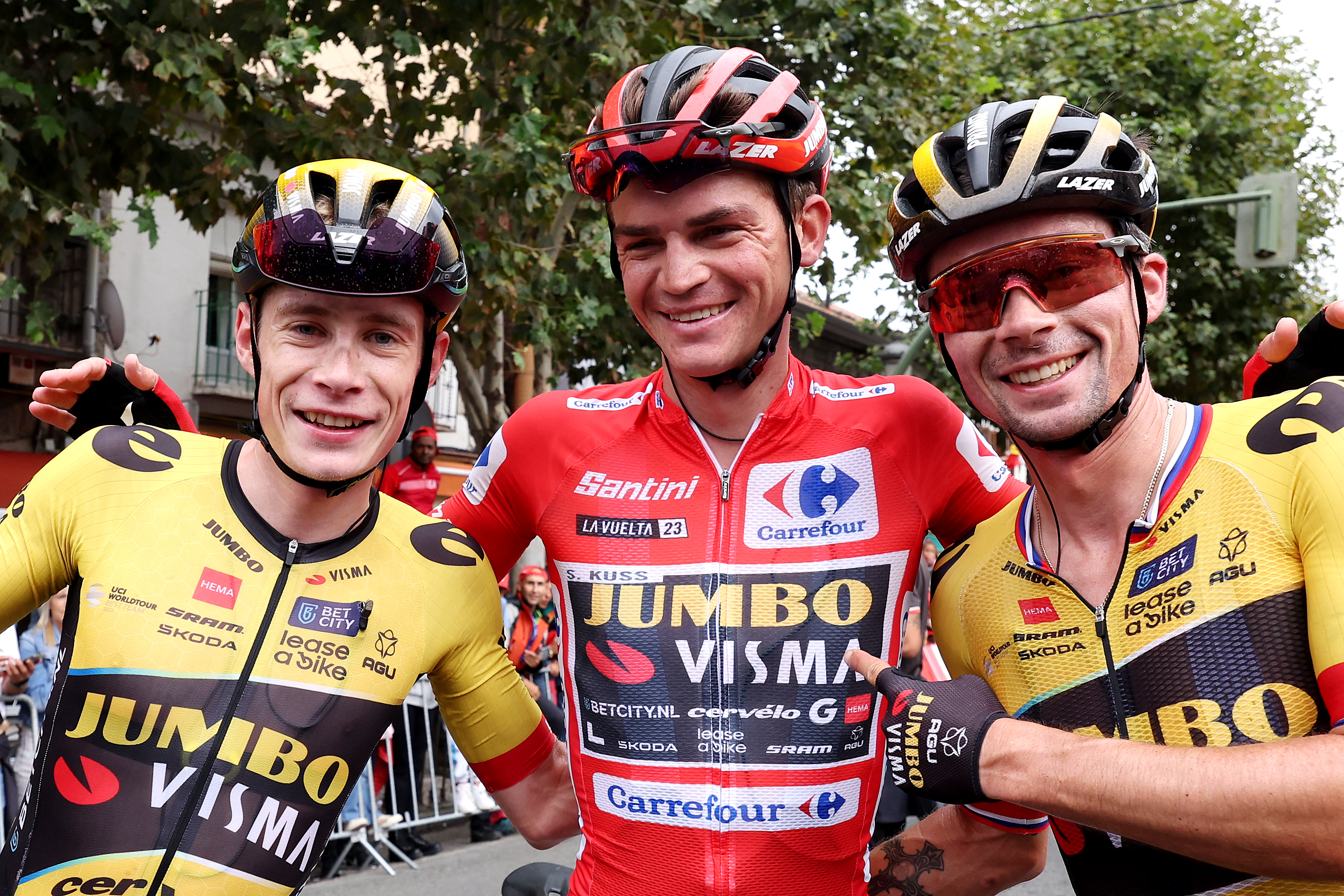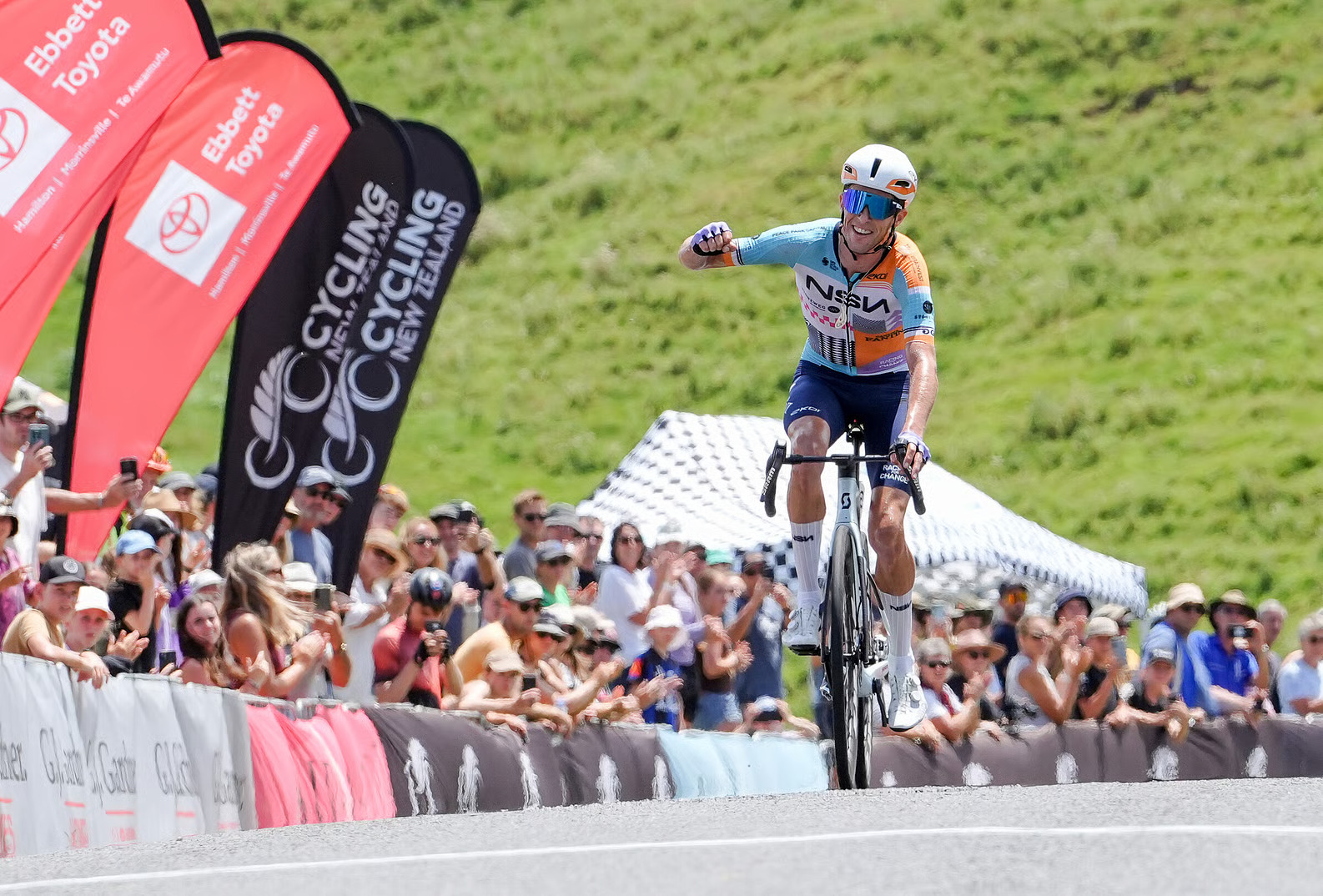Vuelta a España leader Sepp Kuss survives stage 20 unscathed and ready to celebrate
North American headlines historic clean sweep of Vuelta podium for Jumbo-Visma

The latest race content, interviews, features, reviews and expert buying guides, direct to your inbox!
You are now subscribed
Your newsletter sign-up was successful
Sepp Kuss is poised to become the USA’s second-ever winner of the Vuelta a España on Sunday and clinch a career-defining triumph after defending his lead on the last GC stage of the race through the sierras of Madrid.
In a spontaneous show of team unity, the 29-year-old from Colorado crossed stage 20’s finish line arm in arm with Jonas Vingegaard and Primož Roglič, set to finish second and third overall, respectively.
In the process, Jumbo-Visma will make history as the first-ever team to win all three Grand Tours in a single season. They are also the first to take a clean sweep of a Grand Tour’s top-three podium positions since Spanish squad KAS in the 1966 Vuelta a España. In addition, they have taken, so far, five stages out of a possible 20, by far their biggest haul from any Grand Tour this year.
The dream ending for Kuss sees the top climbing domestique claim his biggest victory of his career and his first overall stage race win since the Tour of Utah back in 2018. It also comes after mid-way through the third week, the team abruptly switched a controversial policy to allow the top three Jumbo-Visma riders fight it out for the overall victory to defending Kuss’ overall margin.
“It’s very difficult to put this into words, I’m very happy and it was a great way to finish it all off at the end. I’ve almost, almost won, although there’s still tomorrow to come,” Kuss told reporters afterwards.
Vuelta a España: Wout Poels holds off Remco Evenepoel for victory on stage 20
'No hard feelings at all' – Jumbo-Visma's united front during Vuelta a España's final days
Police tackle Jumbo-Visma staffer after altercation at the Vuelta a España
Will Jumbo-Visma make history at La Vuelta a España with the first Grand Tour triple?
Kuss was the first to admit that he came into the Vuelta with minimal expectations, but as his third Grand Tour of the 2023 season unfolded, his chances improved radically.
Getting in the break and taking an impressive lone stage win at Javalambre in the first week catapulted the American into GC contention. He then claimed red two days later on the ultra-steep slopes of Xorret de Cati and subsequently limited the gaps in perhaps the most difficult stage for the US rider, the medium-length time trial at Valladolid.
The latest race content, interviews, features, reviews and expert buying guides, direct to your inbox!
On the Tourmalet stage, the dramatic disintegration of Remco Evenepoel’s (Soudal-QuickStep) GC bid was followed by a devastating demonstration of collective power by Jumbo-Visma, allowing the team to secure the top three positions overall.
A decision to allow each of the top three to fight it out for the GC saw Kuss lead reduced to eight seconds at one point. But a subsequent change of team strategy, combined with Kuss own strength in the final mountain stages, proved the right combination for him to maintain the lead as far as the final ceremonial stage in Madrid.
Asked at what point in the Vuelta he felt confident about trying to go for the win, Kuss said: “After the Tourmalet stage [stage 13] and after the time trial [stage 10]. The time trial stage was really crucial for me.
“The time trial went 10 times better than I expected, and then on the Tourmalet I felt very good, very confident and able to move forward in the rest of the race.”
Kuss’ success in the Vuelta, too, means that barring absolute disaster on Sunday’s last stage, Jumbo-Visma will become the first team ever to win all three Grand Tours in a single year. And Kuss will have been present in all three, too, either as a domestique or a leader.
“For me personally, it’s just cool to be part of all three of them. Each of these races are very different from the others, and just seeing the differences in each of them, I guess it’s easy to say you get used to it, but there will always be surprises along the way,” he said. “So that’s the thing that’ll always stay.”
Asked if he had anticipated to find himself fighting for the Vuelta two months after the Tour de France, Kuss replied, “Not at all. I never expected it to be this level, but like I said, everything that happens to me or that I achieve in cycling comes in a bit of an unexpected way. It’s kind of funny.”
Success and suspicion almost always go hand in hand in cycling, given its history, and Kuss, along with the two other podium finishers delivered a categorical defence of Jumbo-Visma when asked about how the team should be remembered and if their results would still stand in 10 or 25 years.
“What Primož and Jonas said - I think also,” Kuss said, “and for me personally, cheating or doping is just out of the question because it’s not even sport for me, I think part of sport is losing. Of course you want to win, but if you are doing something that’s prohibited or cheating, then you are afraid of losing. One of the most important parts of sport is accepting sometimes you’re not good enough or that’s just how it is.”
As for the race itself, Kuss started the Vuelta as a top domestique and ended it as the outright winner, and as a result, he said, he has discovered a lot about himself and his capacities in a Grand Tour. He was undecided, it seemed about whether this represented a major change in his career goals from hereon, given he is fond of both of his roles
“I’d like to do more of this [as a GC contender],” he said, “but I like my position as domestique as well.
“I learned a lot of the mental side of being a Grand Tour leader, being focussed and being there, because normally in the Grand Tours there are a lot of days when I’m more checked out mentally because it’s not my battle. Getting through the harder moments - that’s something that I learned.”
That also means that Kuss has learned more about his two teammates as well and how they have helped him en route to what is by far the biggest victory of his career.
“I’ve realise what they’ve done for me, what they’ve had to sacrifice, sporting wise, to help me is not easy because they’re two of the best cyclists in the world," he concluded. "That’s not so easy when used to winning the biggest races in the world. So I’m very grateful for what they’ve done for me.”
Alasdair Fotheringham has been reporting on cycling since 1991. He has covered every Tour de France since 1992 bar one, as well as numerous other bike races of all shapes and sizes, ranging from the Olympic Games in 2008 to the now sadly defunct Subida a Urkiola hill climb in Spain. As well as working for Cyclingnews, he has also written for The Independent, The Guardian, ProCycling, The Express and Reuters.

